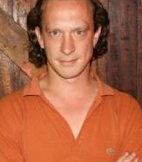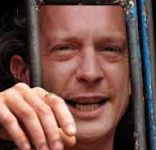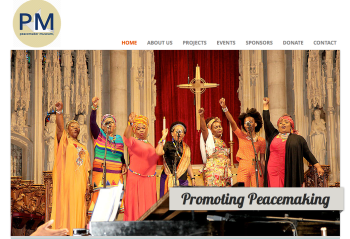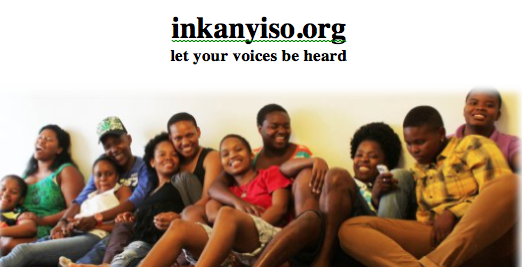By Melanie Nathan, February 13, 2013.
 David Cecil has arrived in the United Kingdom after being deported from his home in Uganda, which he shares with his partner/wife and two small children, and who have now been left behind. Cecil is not an LGBTI activist; he is the producer of a play, The River and the Mountain. He was arrested and his case was dismissed in September of last year, having been accused of staging the play without the requisite permission. Cecil believes he became a target of the Ugandan government because his play had depicted a gay character, even though homosexuality was not the theme of the play.
David Cecil has arrived in the United Kingdom after being deported from his home in Uganda, which he shares with his partner/wife and two small children, and who have now been left behind. Cecil is not an LGBTI activist; he is the producer of a play, The River and the Mountain. He was arrested and his case was dismissed in September of last year, having been accused of staging the play without the requisite permission. Cecil believes he became a target of the Ugandan government because his play had depicted a gay character, even though homosexuality was not the theme of the play.
(Our initial report where we broke the story of Cecil’s impending deportation can be read here http://oblogdeeoblogda.me/2013/02/07/david-cecil-british-producer-detained-for-deportation-from-uganda/.)
Cecil told me that he is distraught because he has been separated, by force, from his wife and their two small children through what seems to be an unwarranted detention and deportation back to his native, United kingdom. “It is appalling that my family have now been so badly affected by this bigotry, not to mention all the people who will now be unemployed who I worked with at Tilapia Cultural Center, the film school I helped set up, and the film trust I was starting, will lose all that they could have benefited from in that region. So destructive and senseless.”
 Cecil provided me with this statement today, a harrowing account of his arrest and deportation:
Cecil provided me with this statement today, a harrowing account of his arrest and deportation:
On January 2nd, the magistrate at Makindye Court dismissed my case due to the failure of the prosecution to provide even a police file relating to the case. These were 2 charges of ‘disobeying an order from a pubic official’, namely that the River and the Mountain should not be performed in Uganda.
At lunchtime on February 6th, 5 immigration officials from the Ministry of Internal Affairs came to Tilapia Centre, Bunga, where the play was performed and demanded to see me. I eventually consented to go with them to the Ministry where I was told that I was to be deported ‘immediately’. I was not shown the related documentation, but glanced at a document that was signed by the Minister for Internal Affairs that simply said ‘Undesirable’ in the explanation section, with no further indication as to why I was being deported. The officer on charge of my case was not forthcoming with any further explanation.
After consulting with a lawyer, I indicated to the immigration officer that I wished to appeal this decision in the High Court. However, at 5pm, I was taken to Jinja Rd. police station, where I remained until Monday 11th Feb.
During this time I had limited access to the outside world. Though the senior authorities were obliging and friendly, they said that immigration officials were handling my case, so they could not tell me anything relating to my case. I was in the dark, literally and figuratively. Furthermore they would/could not let me talk to lawyers, friends or family for more than a few minutes / day. In some cases visitors had no more than 2 minutes to talk to me before their visit was terminated.
I was reasonably well treated, but conditions in the station were tougher than Luzira remand prison (where I spent 4 nights in September). (After he was arrested for staging a play that happened to have a gay character in it.)
On Saturday night, our two 4m x 4m rooms contained no fewer than 43 inmates, some drunken and unpredictable in their behaviour. While there was much camaraderie among most inmates, there was also poor hygiene, disease, and psychological and physical enforcement of hierarchy. Outright violence was rare.
Nourishment consisted solely of one modest plate of posho (maize starch) and unseasoned beans / day. Washing, smoking and toilet business happened in the same small corner, shared by all. We all slept on the floor, with privileged guests having a layer of three blankets beneath us, the less privileged, one or none.
On Monday at around 5pm I was suddenly informed that I was to leave. I was led into a waiting vehicle containing 2 plainclothes police officers and a uniformed officer with a Kalashnikov. We drove the 45km to Entebbe airport at high speed, with hazard lights on, brushing traffic aside. There I was issued a deportation document by an immigration official and locked into another small room for 3 hours, without food or water and then led onto the plane and flown to the UK.
I am currently preparing to appeal the deportation order in the High Court of Uganda, since it is an extra-judicial order and is seemingly based on political, rather than legal considerations.
It is very important that I remain within Uganda, since I wish to live full-time with my Ugandan partner of 6 years and wish to raise our two children in Uganda. I have also recently been offered a permanent position at Kampala University’s film school as a lecturer and administrator.




















 PoochParkWear customizes hoodies and t-shirts, the good, the naughty, the in between, whether proud or quirky let them be seen. We also offer biker jackets, croc or pleather collars, a variety of collar charms, and our special Zinja beaded collars made by a co-op of HIV-positive South African women, the Sisonke women who weave the beads onto the collars.
PoochParkWear customizes hoodies and t-shirts, the good, the naughty, the in between, whether proud or quirky let them be seen. We also offer biker jackets, croc or pleather collars, a variety of collar charms, and our special Zinja beaded collars made by a co-op of HIV-positive South African women, the Sisonke women who weave the beads onto the collars.

Trackbacks/Pingbacks
[…] Read more […]
[…] Cecil describes his experience and the deplorable conditions in detention, which we reported previously at: http://oblogdeeoblogda.me/2013/02/13/british-producer-describes-harsh-detention-conditions-and-dep… […]